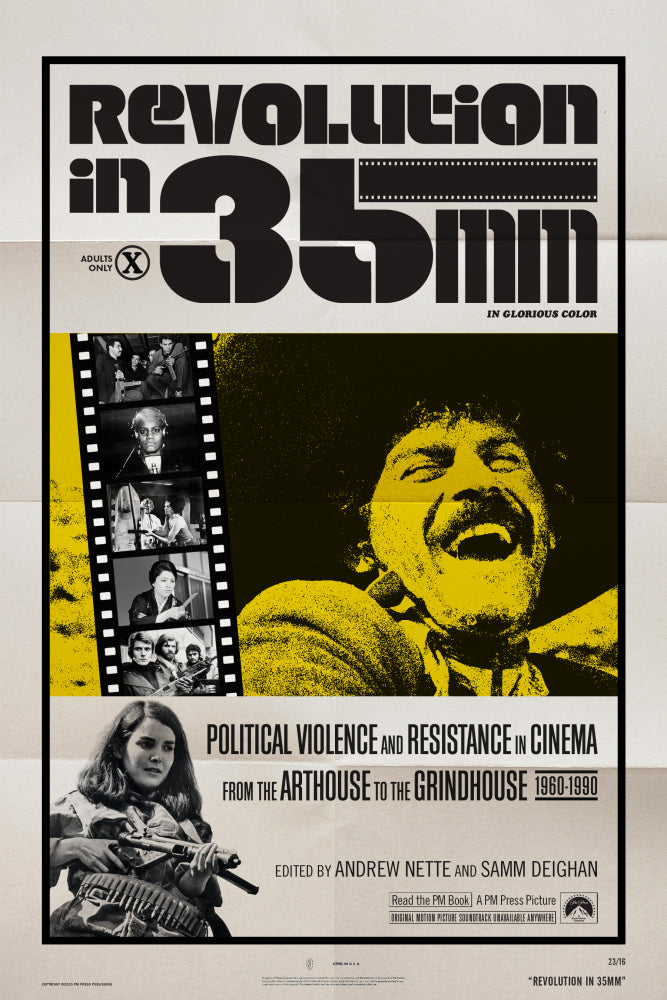Revolution in 35mm
Revolution in 35mm
Political Violence and Resistance in Cinema from the Arthouse to the Grindhouse, 1960-1990
Andrew Nette & Samm DeighanCouldn't load pickup availability
Revolution in 35mm: Political Violence and Resistance in Cinema from the Arthouse to the Grindhouse, 1960-1990 examines how political violence and resistance was represented in arthouse and cult films from 1960 to 1990.
This historical period spans the Algerian war of independence and the early wave of post-colonial struggles that reshaped the Global South, through the collapse of Soviet Communism in the late '80s. It focuses on films related to the rise of protest movements by students, workers, and leftist groups, as well as broader countercultural movements, Black Power, the rise of feminism, and so on. The book also includes films that explore the splinter groups that engaged in violent, urban guerrilla struggles throughout the 1970s and 1980s, as the promise of widespread radical social transformation failed to materialize: the Weathermen, the Black Liberation Army and the Symbionese Liberation Army in the United States, the Red Army Faction in West Germany and Japan, and Italy's Red Brigades.
Many of these movements were deeply connected with and expressed their values through art, literature, popular culture, and, of course, cinema. Twelve authors, including academics and well know film critics, deliver a diverse examination of how filmmakers around the world reacted to the political violence and resistance movements of the period and how this was expressed on screen. This includes looking at the financing, distribution, and screening of these films, audience and critical reaction, the attempted censorship or suppression of much of this work, and how directors and producers eluded these restrictions.
Including over two hundred illustrations, the book examines filmmaking movements like the French, Japanese, German, and Yugoslavian New Waves; subgenres like spaghetti westerns, Italian poliziotteschi, Blaxploitation, and mondo movies; and films that reflect the values of specific movements like feminists, Vietnam War protesters, and Black militants. The work of influential and well-known political filmmakers such as Costa-Gavras, Gillo Pontecorvo, and Glauber Rocha is examined side by side with grindhouse cinema and lessor known titles by a host of all-but forgotten filmmakers, including many from the Global South, that are deserving of rediscovery.
Andrew Nette is an author of fiction and non-fiction. He is co-editor of three previous books for PM Press, Girl Gangs, Biker Boys and Real Cool Cats: Pulp Fiction and Youth Culture, 1950-1980; Sticking it to the Man: Revolution and Counterculture in Pulp and Popular Fiction, 1950--1980; and Dangerous Visions and New Worlds: Radical Science Fiction, 1950-1985. His writing on film, books and culture has appeared in a variety of print and on-line publications. He has also contributed video and print essays and commentaries to a number of DVD/Blu-ray releases. You can find him via his website www.pulpcurry.com.
Samm Deighan is a film historian and writer and editor of several books, including of The Legacy of WWII in European Art House Cinema (2021) and a monograph on Fritz Lang's M (2019). She's a special features producer for Vinegar Syndrome and co-hosts the Twitch of the Death Nerve podcast.
- Publisher: PM Press
- Publish Date: October 1, 2024
- Pages: 384
- Dimensions: 6.0 X 9.0 inches | 1.11 pounds
- Language: English
- Type: Paperback
- EAN/UPC: 9798887440606
- BISAC Categories: Film - History & Criticism

